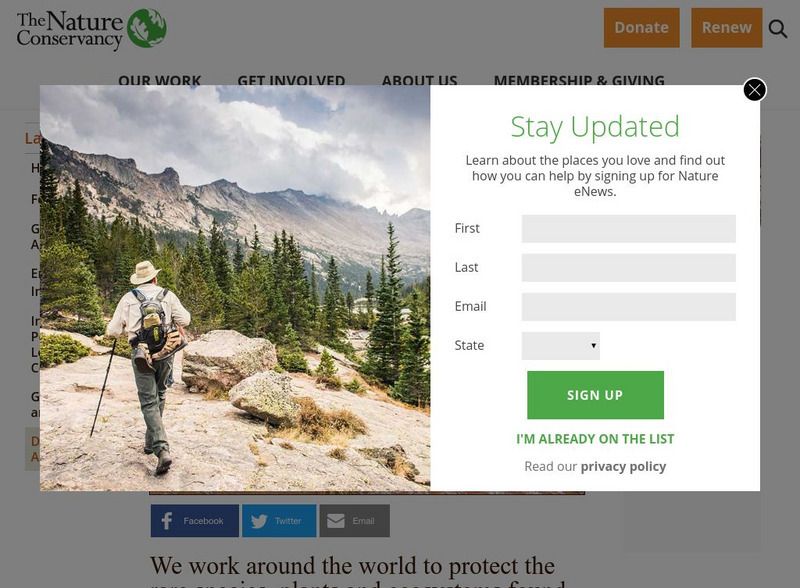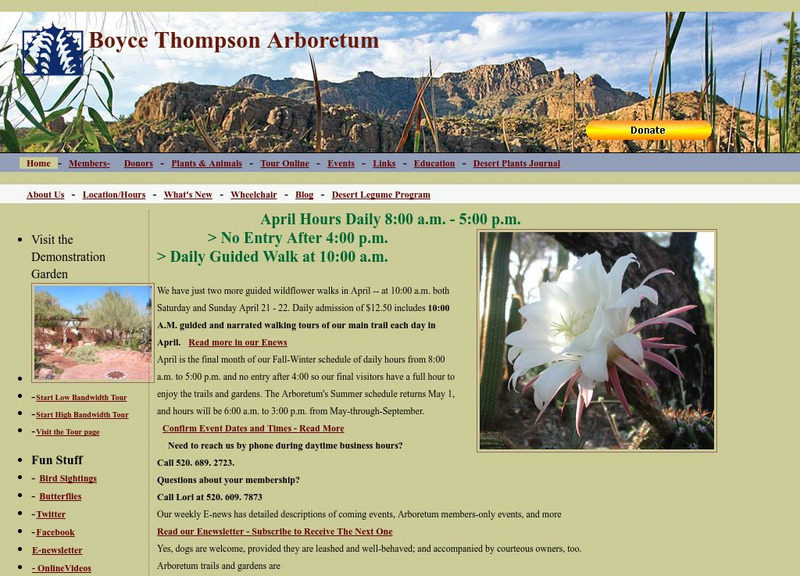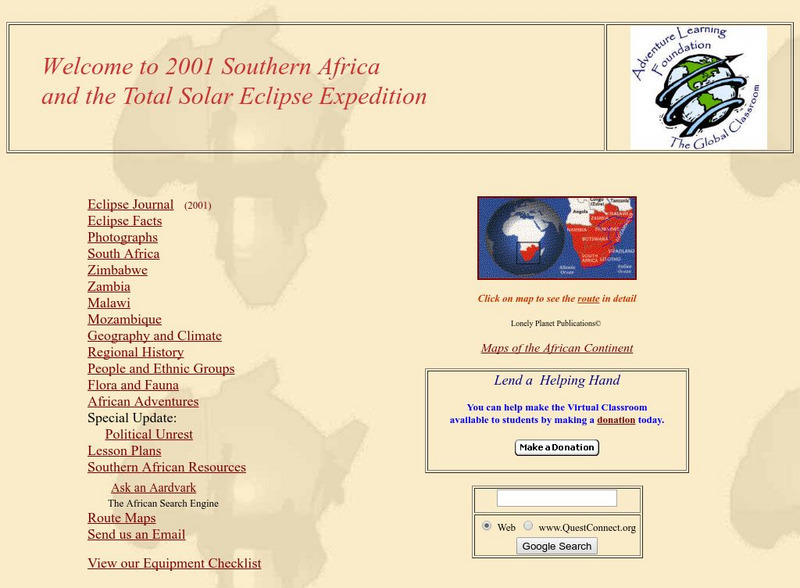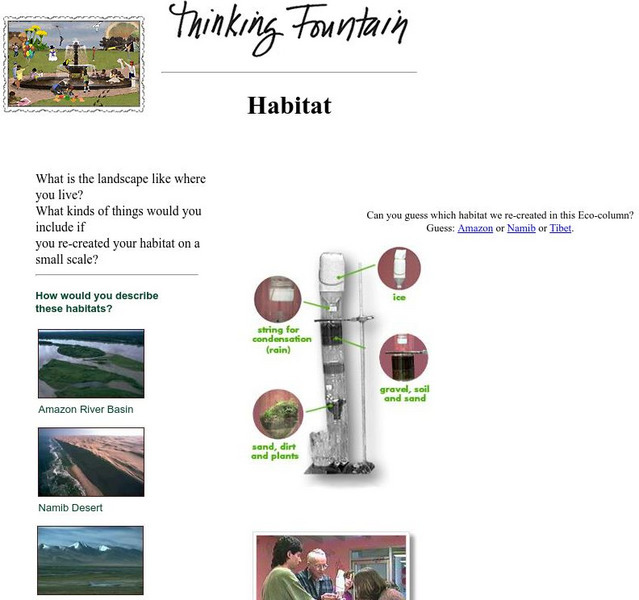Hi, what do you want to do?
American Museum of Natural History
Going Gobi: The Hunt for Fossils in Mongolia
Take a trip on a fossil hunt. Pupils read about a trip to the Gobi Desert by a group of paleontologists to find fossils. Learners view pictures taken on the trip and determine what the scientists go through in the search for answers to...
American Museum of Natural History
What's This? Life at the Limits
There are some amazing ways species evolve to survive. From large ears to sneezing salt, learners read about these interesting adaptations in an interactive lesson. Great to supplement an in-class lesson, it also works well as a remote...
American Museum of Natural History
Being a Paleontologist: Mark Norell
Get to know paleontologist Mark Norell with a 19 question interview. Written questions, answers, and photographs with descriptions sit among bright and cheery graphics
Enchanted Learning
Enchanted Learning: Desert
Students will enjoy a general description of a desert habitat, an easy-to-understand chart of the largest deserts in the world, and brightly colored pictures and descriptions of desert animals complete with printouts. There is also a...
Oxfam
Oxfam's Cool Planet: Animals of the Desert
Resource looks at the different types of insects, mammals, reptiles, and birds found in the desert and the strategies they use for survival.
Nature Conservancy
Nature Conservancy: Planet Earth: Deserts and Aridlands
The desert areas in the United States that this organization is working to protect are portrayed through photographs and videos, showing the beauty of the landscapes and the diversity of life forms there.
PBS
Pbs Learning Media: Desert Elephants
In this video from Nature, observe elephants trek across the desert to an isolated waterhole. [4:13]
Ducksters
Ducksters: Animals for Kids: Colorado River Toad
Kids learn about the Colorado River Toad. The largest native toad in the United States likes dry areas and deserts..
Curated OER
Bureau of Land Management: Alaska's Cold Desert
Learn about the Arctic tundra biome of Alaska. A discussion of its characteristics, and the animals and the plants that live there.
Other
Greatest Places: Namib
Explore the Namib Desert and learn about its location, the Skeleton Coast, mirages, and general information about this home to the highest sand dunes in the world.
Ducksters
Ducksters: Science for Kids: Desert Biome
Kids learn about the desert biome. The dryest areas on Earth still have plant and animal life.
Other
The Centennial Museum and Chihuahuan Desert Gardens
The Centennial Museum is an academic support and outreach unit of the University of Texas at El Paso focusing on the natural history and the indigenous, colonial, pre-urban, and folk cultures of the border regions of the southwestern...
Ducksters
Ducksters: Animals for Kids: Bactrian Camel
Kids learn about the Bactrian Camel. Animals that can survive the tough desert without water or food are now endangered.
University of Arizona
University of Arizona: Boyce Thompson Arboretum
This Arizona-based state park features current information about its wildlife, wildflowers, plants and trees, gardens, and the like. Illustrated.
Other
Arizona Game and Fish Department: Big Game Species
Detailed information on a variety of big game that are hunted in Arizona. Includes each animal's life history, their hunt history, behavior, and a chart listing facts, e.g., habitat, predators, etc., as well as a narrated video of them...
Enchanted Learning
Enchanted Learning: Biomes
Discover the hidden treasures in the different habitats on the earth! The earth is filled with many biomes. Examples of different biomes are listed and include hyperlinks to additional information such as the animals found there.
Ducksters
Ducksters: Animals for Kids: Meerkat
Kids learn about the meerkat, ground dwelling African mammal that lives in complex family clans.
Other
Ocean Oasis: Field Guide
Ocean Oasis is a giant-screen film that depicts Mexico's Sea of Cortes and the Baja California desert. This companion site features much of the information the film has, such as beautiful images of animals, water, and land that have...
Other
Online Expeditions: African Adventure
Use this site to explore several regions of Africa, without having to leave the classroom.
PBS
Pbs Teachers: Life in the Sahara (Lesson Plan)
A lesson in which students share prior knowledge and conduct research about the location, people, and animals of the Sahara region of Africa. Involves the creation of a project about the geography of the Sahara and how desertification...
Other
Sos Children's Villages: Our Africa Geography and Wildlife
Our Africa is a project that allows the children of Africa to film their lives and their country the way they see them. This section summarizes the geography and wildlife and includes videos about forestry, the Nile, Lake Naivasha, and...
Adventure Learning Foundation
Adventure Learning Foundation: Southern Africa
Explore the geography, culture, history, and people of Southern Africa in this site. It includes journal excerpts, pictures, maps, and classroom activities.
Science Museum of Minnesota
Science Museum of Minnesota: Thinking Fountain: Habitat
Explore the basics of a few habitats and then create an ecocolumn--a simulated cross-section of a biome such as a rain forest--with your own environment.
Other popular searches
- Worksheets on Desert Animals
- Habitat Desert Animals
- Namib Desert Animals
- Australian Desert Animals
- Desert Animals Lesson Plans
- Nocturnal Desert Animals
- Namibia Desert Animals
- S.w. Desert Animals
- Desert Animals in Arizona
- Booklet Desert Animals
- Animals of the Namib Desert
- Sahara Desert Animals






















